江苏省徐州市铜山区太山中学牛津译林版九年级上册英语:9AUnit 4 Growing up Revision课件(共67张PPT)
文档属性
| 名称 | 江苏省徐州市铜山区太山中学牛津译林版九年级上册英语:9AUnit 4 Growing up Revision课件(共67张PPT) |

|
|
| 格式 | zip | ||
| 文件大小 | 1.2MB | ||
| 资源类型 | 教案 | ||
| 版本资源 | 牛津译林版 | ||
| 科目 | 英语 | ||
| 更新时间 | 2016-02-18 00:00:00 | ||
图片预览

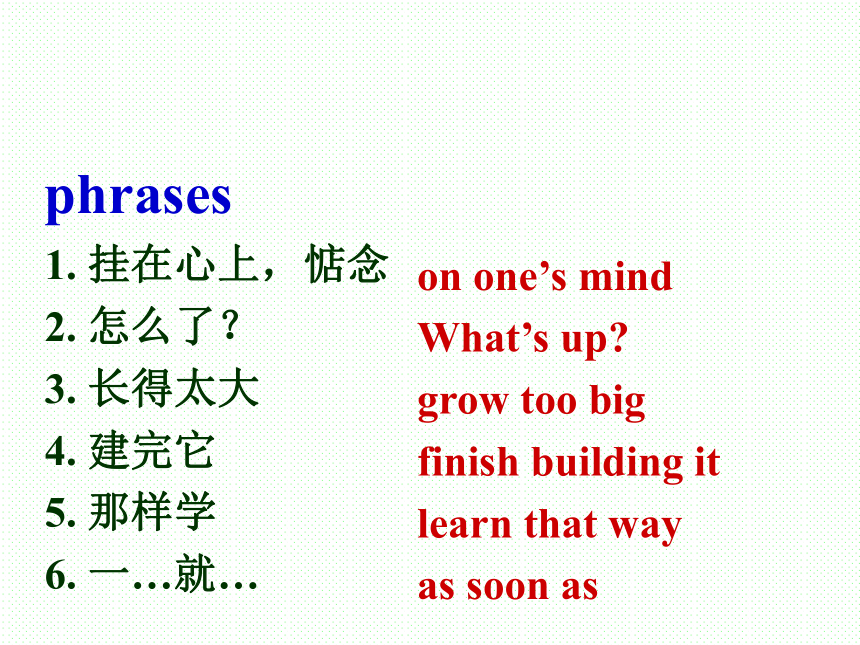
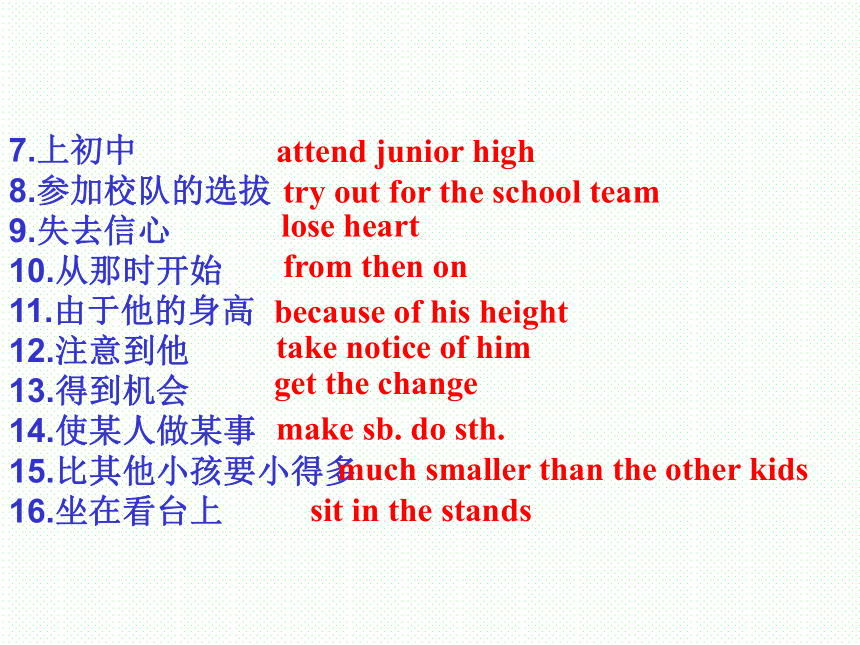
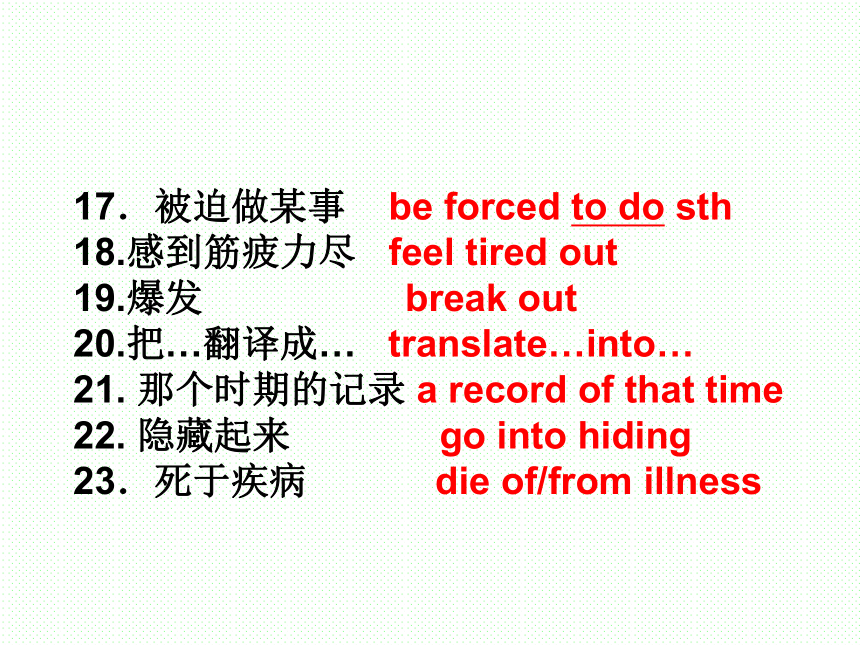
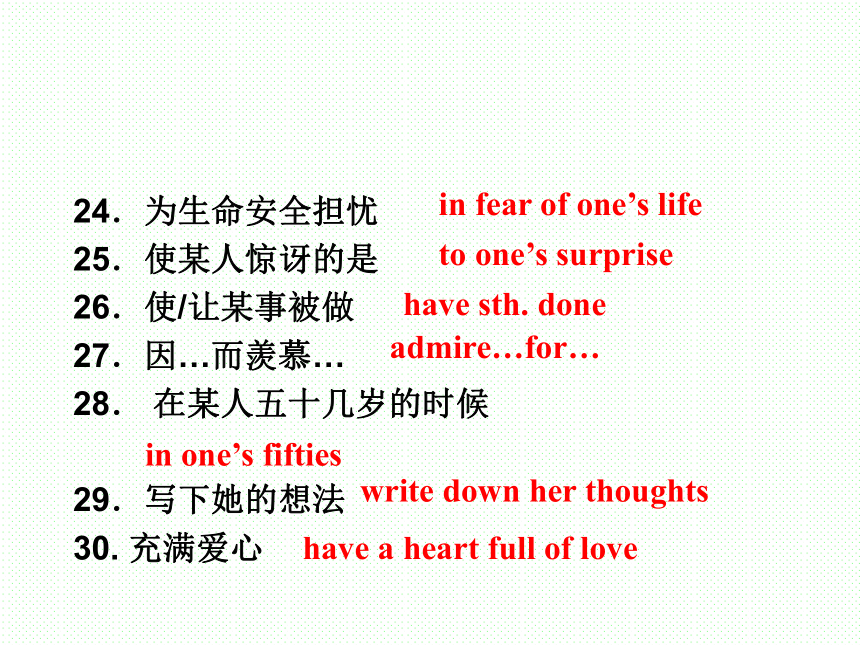


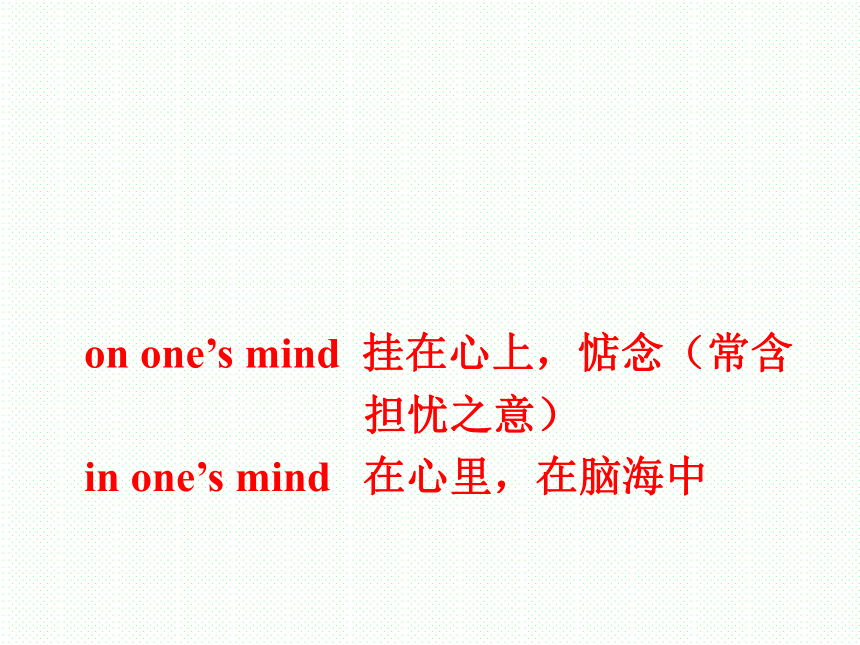
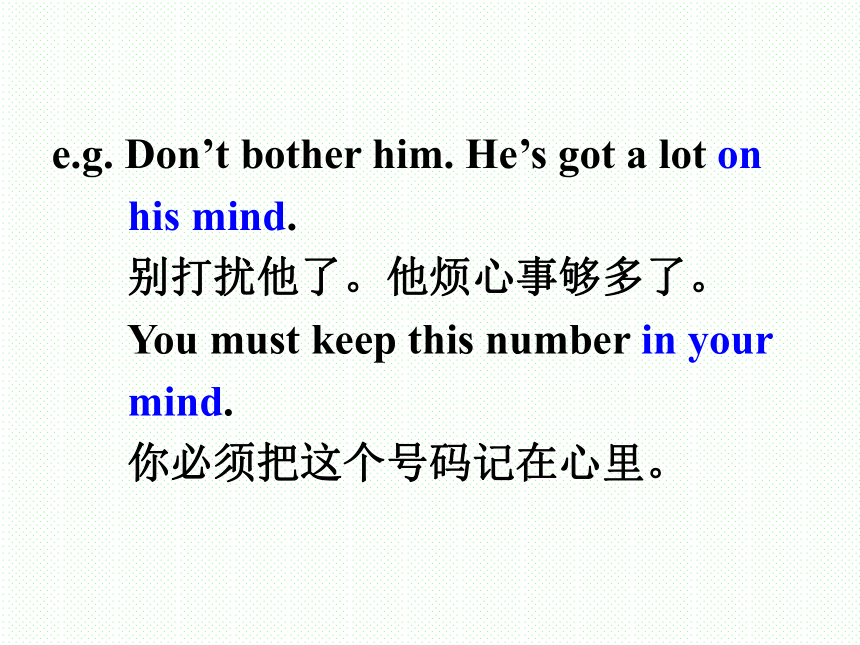
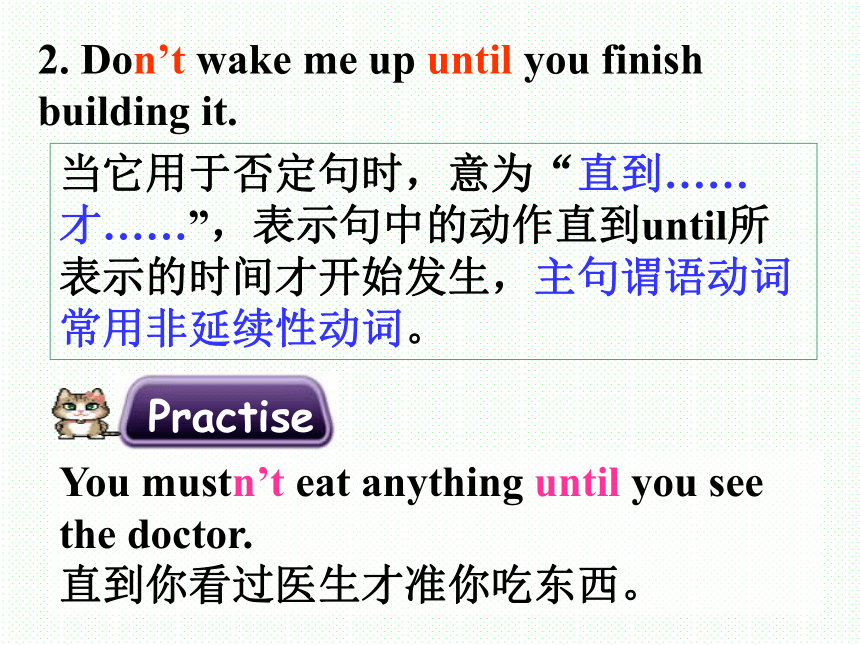
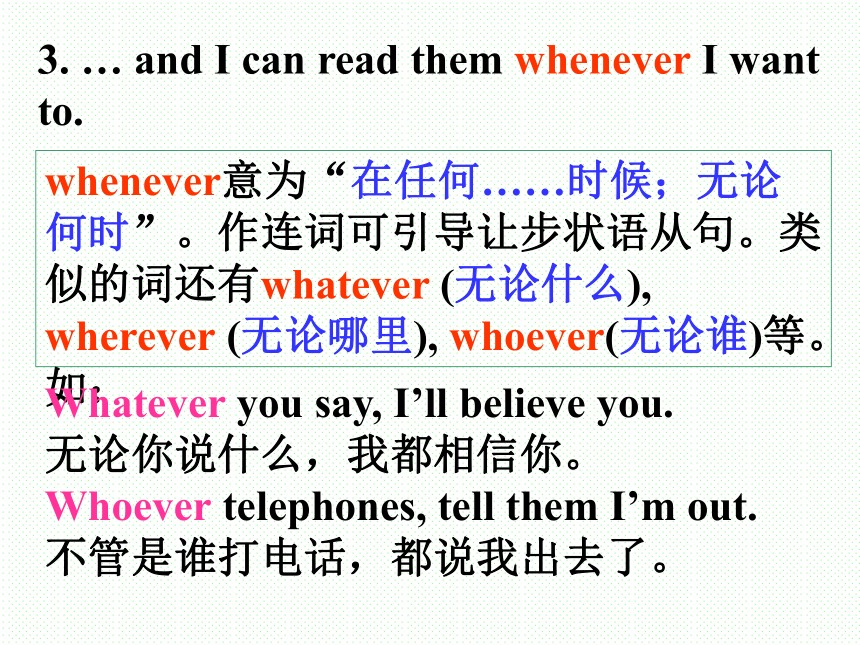
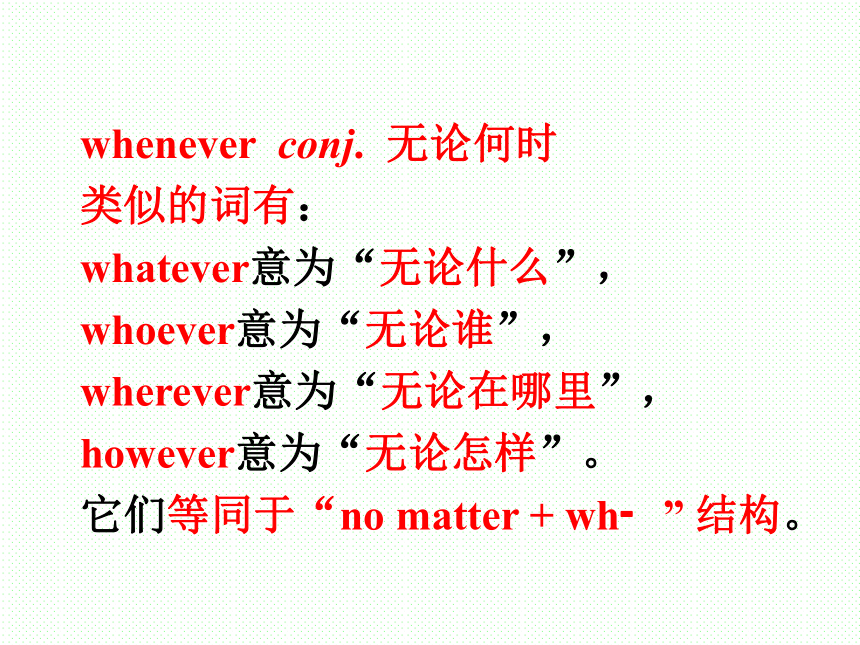
文档简介
课件67张PPT。Unit 4 Growing upRevisionphrases
挂在心上,惦念
2. 怎么了?
3. 长得太大
4. 建完它
5. 那样学
6. 一…就…on one’s mind
What’s up?
grow too big
finish building it
learn that way
as soon as
7.上初中
8.参加校队的选拔
9.失去信心
10.从那时开始
11.由于他的身高
12.注意到他
13.得到机会
14.使某人做某事
15.比其他小孩要小得多
16.坐在看台上attend junior hightry out for the school teamlose heartfrom then onbecause of his heighttake notice of himget the changemake sb. do sth.much smaller than the other kidssit in the stands17.被迫做某事 be forced to do sth
18.感到筋疲力尽 feel tired out
19.爆发 break out
20.把…翻译成… translate…into…
21. 那个时期的记录 a record of that time
22. 隐藏起来 go into hiding
23.死于疾病 die of/from illness
24.为生命安全担忧
25.使某人惊讶的是
26.使/让某事被做
27.因…而羡慕…
28. 在某人五十几岁的时候
29.写下她的想法
30. 充满爱心 in fear of one’s lifeto one’s surprisehave sth. done admire…for…in one’s fiftieswrite down her thoughtshave a heart full of loveLanguage points1. What’s on your mind, Eddie?短语on one’s mind意思是“(有事)挂在心上;烦恼”。Don’t bother him. He’s got a lot on his mind.
别打扰他了。他烦心事够多了。
on one’s mind 挂在心上,惦念(常含
担忧之意)
in one’s mind 在心里,在脑海中e.g. Don’t bother him. He’s got a lot on his mind.
别打扰他了。他烦心事够多了。
You must keep this number in your mind.
你必须把这个号码记在心里。2. Don’t wake me up until you finish building it.当它用于否定句时,意为“直到……才……”,表示句中的动作直到until所表示的时间才开始发生,主句谓语动词常用非延续性动词。You?mustn’t eat anything?until?you see the doctor.
直到你看过医生才准你吃东西。 3. … and I can read them whenever I want to.whenever意为“在任何……时候;无论何时”。作连词可引导让步状语从句。类似的词还有whatever (无论什么), wherever (无论哪里), whoever(无论谁)等。如:Whatever you say, I’ll believe you.
无论你说什么,我都相信你。
Whoever telephones, tell them I’m out.
不管是谁打电话,都说我出去了。
whenever conj. 无论何时
类似的词有:
whatever意为“无论什么”,
whoever意为“无论谁”,
wherever意为“无论在哪里”,
however意为“无论怎样”。
它们等同于“no matter + wh?” 结构。e.g. You can ask me for help whenever you
are in trouble.
= You can ask me for help no matter
when you are in trouble.
你要是在困境里可以随时叫我帮忙。4. As soon as you click the mouse, there’s a great deal of information.as?soon?as意为“一……就”,引导时间状语从句。在含as?soon?as引导的时间状语从句的复合句中,如果主句是一般将来时,则从句常用一般现在时。如: I?will?call?you?as?soon?as?I?get?home.?
我一到家,就给你打电话。a great deal意为“大量”,可单独使用。
a great deal of = much 只能修饰不可数名
词,表示“大量的”。
e.g. They talked a great deal about this problem.
他们针对这个问题谈论了很多。
Drinking a great deal of wine is harmful to your health.
?????? 喝大量的酒有害健康。其他表示“许多”的词汇及其用法: 5. Why do you like to learn that way?
learn that way 以那种方式学习
e.g. Don’t speak to your parents that
way.
不要以那种方式和你父母说话。6. Books allow me to learn about people in different times and places.
书让我了解不同时期、不同地方的人。
allow sb. to do sth. 允许某人做某事(主)
sb + be allowed to do sth. (被)
* allow doing sth. 允许做某事
time n. 时期, 时代7. He was very small — much smaller than the other kids at school.比较级前可以加much, a little, quite, even等副词表示程度或加强比较。如:Shanghai is much bigger than my hometown.
上海比我的家乡大多了。
He practised even harder and got the coach to change his mind.
他训练更加刻苦,终于使教练改变了看法。8. While attending junior high, Spud tried out for the school team …
(1) attend junior high 上初中
(2) try out for sth 参加……选拔(或
试演)
e.g. Why don’t you try out for the
school basketball team?
你为何不参加学校篮球选拔赛呢?9. He did not lose heart.他没有灰心。
e.g. When you fail, you should never
lose heart.
当你失败时,不应该丧失信心。lose heart表示 "泄气,灰心"。No matter what you do, never lose heart.
不管你做什么,千万不可泄气。10. From then on, he was the star of the team.
from then on 从那时起(常与一般过去时连用)
e.g. From then on, he was with his
dog every day.
从那时起,他每天和他的狗在一
起。11. He practised even harder and got the coach to change his mind.mind作动词,意为“介意,在乎,反对”。mind doing sth.意为“介意做某事”。mind作名词,意为“想法,意见”。
与mind相关的短语:
keep sth. in mind 记住某事
change one’e mind 改变主意
make up one’s mind 下决心change one’s mind 改变主意
e.g. Nothing will make me change
my mind.
什么都不能让我改变主意。Excuse?me,?would?you?mind? ?your?voices?down,?please??(2012?四川绵阳)
?????A.?to?keep???????????B.?keeping??????????
?????C.?keep???????????????D.?kept我希望你不要介意。
I hope you don’t mind.
你介意照顾一下我的孩子吗?
Would you mind looking after my child?12. As a result, he succeeded in getting a scholarship.
句中的succeed是不及物动词,短语succeed in doing something意思是“在……达到目的,实现目标”。
e.g. He succeeded in getting a place
at art school.
他被美术学校录取了。succeed?in doing意为“(在某方面)取得成功;达到目的”。
succeed是动词,其名词形式是success, 形容词为successful,副词为successfully。 根据汉语意思完成句子。
王诚成功地在竞赛中获胜。
Wang Cheng ___________ winning the competition. succeeded in13. After he graduated, he was forced to play in another basketball league.
force vt. 强迫,迫使
force sb to do sth 强迫某人做某事
e.g. Don’t force the child to play the
piano.
不要强迫这个孩子学习弹钢琴。
They were forced to leave their
home town.
他们被迫离开了家乡。14. He remained there for about a year before the NBA took notice of him.
remain = stay 逗留 vi.
e.g. We will remain in Shanghai for
ten days.
我们要在上海逗留10天。
remain = keep 保持
remain + adj. / doing
e.g. Don’t remain standing there.
不要一直站在那。take notice of 注意,察觉
e.g. Don’t take any notice of what you
read in the papers.
别在意你在报上看到的东西。15. Through hard work, Spud Webb proved that size and body type does not matter.matter用作动词,意思是“要紧,有重大影响”。如:The job matters more to him than anything else.
对他来说,这份工作比其他什么都重要。 matter用作名词时,表示“毛病,麻烦事”,常用于句型What’s the matter with sb./sth.?16. World War Ⅱ broke out in Europe in 1939 and ended in 1945.break?out?(战争、火灾等不愉快事件)突然发生,爆发。
注意:不及物动词,不能带宾语,也不能用于被动语态。 Fire broke out during the night.
夜间突然发生了火灾。break的短语:
break the rule? 违反规则;
break off? 突然中止;中断;
break down? 停止运转;出故障
break up 打碎,分裂
break into 闯入,破门而入 17. She and her elder sister died of illness in 1945.和die相关的常用短语:
die?from?/?of?死于……
die?out常指家族、观念、习俗等的逐渐消失或(动植物)物种的灭绝 如:
We no longer see this animal, probably because it has died out.
In a cold winter, some animals can die from lack of food.18. After the war, her father collected her
diary and had it published in 1947.
have sth. done 使/让某事被完成
e.g. I had my hair cut last Saturday.
我上周六理了发。
I will have my bicycle repaired
tomorrow.
明天我想请人把自行车修一下。19. … his journey to Copenhagen after he got away from a Nazi camp.
get away from … 逃离……
e.g. The thieves got away from the
shop with all our money.
小偷拿走了我们所有的钱逃离了
商店。20. I admire these children for their courage.
admire vt. 钦佩;羡慕
admire sb. for sth. 因某事钦佩某人
e.g. I admire them for their hard-
working spirit.
我非常钦佩他们的苦干精神。21. My father is in his fifties.in one s fifties 在五十多岁时(fifties 前可插入 early, late, mid-, middle)
类似表达:
in one’s teens/ twenties/ thirties/ forties/… 她有二十五、六岁。
She was in her mid-twenties. ?
他当时已经快八十岁了。
He was then in his late seventies.
表示整十的数词后加s变成复数,用在“in one’s + 数词复数”短语中,表示“某人年龄处于某段时间”。如:
in one’s twenties/ thirties/ forties
在某人二十/三十/四十多岁时表示整十的数词后加s变成复数,也可以用在“in the + 数词复数”短语中,表示“在某个年代”。如:
in the seventies/ eighties/ nineties
在七十/八十/九十年代22. To my surprise, he has decided to donate his body for medical research after his death.
to one’s surprise 令某人惊奇的是
e.g. To my surprise, the task was
finished in only one week.
使我惊讶是,这项任务仅一周就
完成了。23. He is ready to help anyone.be?ready?to?do?sth.?(1) 乐于做某事
(2) 准备好做某事我准备好开始我新的校园生活。
I’m?ready?to?start?my?new?school?life.?托尼乐于和我们一起做家务。
Tony?is?ready?to?do?the?housework?with?us.donate意为“捐赠,赠送(财物等)(尤指对慈善事业)”,常用donate ... to… “捐献……给……”。如:She donated her books to the library.
她把自己的书捐赠给了图书馆。24. He has also donated blood cells to people with blood cancer.25. To my surprise, he has decided to donate his body for medical research after his death.surprise?作动词,意为“使……惊奇”;surprise作名词,意为“惊奇,诧异”;surprising是形容词,意为“令人惊讶的”,常用来修饰事物;surprised也是形容词,意为“吃惊的,惊讶的”,常用来指人。 用所给单词的适当形式填空。
The most __________ (surprise) thing is that he has been fired after working there for only half a month.句中的to?everyone’s?surprise意为“令大家惊讶的是”。 令我吃惊的是,他没有告诉我就去日本了。
To my surprise, he went to Japan without telling me.surprising时间状语从句是指在复合句中充当时间状语的句子。如:When the weather is good, my grandpa likes going fishing.
当天气好的时候,我爷爷喜欢去钓鱼。
The sun came out after the storm stopped.
暴风雨停止后,太阳出来了。注意: 我们可以用before, after, when和while引导时间状语从句,这些词既可放在句首,也可放在句中。before的意思是“在……之前”,表示主句动作发生在从句动作之前。如:Close the windows before you leave the room, please.
在你离开房间前,请关上窗。after意思是“在……之后”,表示主句的动作发生在从句的动作之后。如:I went to school after I finished my breakfast.
我吃完早饭去上学。when意思是“当……时”,表示主句动作发生的特定时间。如:While my sister was sweeping the floor, I was washing the dishes.
我姐姐扫地时,我在洗碗。while意思是“当……时”,强调主句动作和从句动作是同时发生的。如:The days get longer when spring comes.
春天到来时,白天变长了。注意:while引导的从句的谓语动词必须是延续性的。while还可以表示“在……期间”,表示主句动作发生在从句动作进行的过程中。如:While the boys were playing football, it rained.
当男孩子们踢足球时,下雨了。注意: 在when和while引导的从句中,当主句和从句的主语一致,并且从句中有be动词时,可以省略主语和be动词,构成when/while+ -ing结构。如:When (she is) in trouble, she always asks for my help.
她遇到困难时总是向我求助。
While (I am) travelling, I like to buy some souvenirs.
旅游时我喜欢买纪念品。四、before, after, since, till, until还可作
介词,后接时间名词。e.g. before 9 a.m. till/until today
since 2009 after lunch 五、当主句和从句的主语是同一个人时
还可用:before/ after/ when/ while
doing sth.e.g. You’d better not listen to music while
doing your homework.since, till和until常用来引导时间状语从句。如:Mr Brown has been in Beijing since you left.
自从你离开,布朗先生就一直待在北京。
I worked till/until he came back.
我一直工作到他回来为止。since意思是“自从……以来”。一般情况下,从句谓语动词用一般过去时,而主句的谓语动词用现在完成时。如:注意:since引导的从句的谓语动词可以是延续性动词,也可以是瞬时动词。They have been friends since they were at primary school.
他们从小学起就一直是好朋友。till和until意思是 “到……为止” ,一般情况下两者可以互换。until可以放在句首或句中,而till不可以用在句首。
注意:如果主句中的谓语动词是瞬时动词时,必须用否定形式,即“not…until”结构,意思是“直到……才(开始)”。如:Walk till/until you see a white house.
一直走到你看到一座白房子为止。
I did not go to bed until I finished my homework.
直到做完作业我才上床睡觉。 till和until通常可以互换,但当“直
到”这词用于句首或与not连用时只
能用until。e.g. They didn’t come back until it was
dark. 我们常用as soon as和whenever引导时间状语从句。如:As soon as I arrive in Canada, I will call you.
我一到加拿大,就给你打电话。
Whenever he met us, he smiled at us.
他每次遇见我们,都向我们微笑。as soon as意思是“一……就”。如:We began to work as soon as we got there.
我们一到那里就开始工作。
He will visit you as soon as he gets there.
他一到那里就会去拜访你。whenever意思是“每当,任何时候”。如:注意:whenever可以用every time替换。He likes listening to music whenever he has time.
每当他有时间的时候,他喜欢听音乐。
练习1111is namedhandingto stealachievementsnot to playsmarterto beto acceptto havehelping1假如你是Sandy, 你学校正在举行写作比赛,主题是
“The person who has impressed me most", 字数100个字左右。内容如下:
Writing: My uncle 四十多岁,
在当地医院工作 工作细心
对待病人有耐心
使我惊讶的是,他已经决定... 乐于助人
关爱一些失独老人Post-writing: Sample
The person who has influenced me most is my uncle.You
will not find anything unusual until you learn more.
As a doctor, he is both kind and patient with patients.
Besides, he is so careful that he has never made any
mistakes. He says:"As a doctor,We can't be too careful."
What’s more,he cares for the old who have lost their only
children.To my surprise, my uncle has decided to donate
not only all his money but also his body after his death. How
brave and kind-hearted his is!
All in all, I have been impressed by my uncle. I
realize that he is a man has a heart full of love.Homework1. Finish the exercises in Learning English.
2. Preview the new words and expressions in Unit 5.
挂在心上,惦念
2. 怎么了?
3. 长得太大
4. 建完它
5. 那样学
6. 一…就…on one’s mind
What’s up?
grow too big
finish building it
learn that way
as soon as
7.上初中
8.参加校队的选拔
9.失去信心
10.从那时开始
11.由于他的身高
12.注意到他
13.得到机会
14.使某人做某事
15.比其他小孩要小得多
16.坐在看台上attend junior hightry out for the school teamlose heartfrom then onbecause of his heighttake notice of himget the changemake sb. do sth.much smaller than the other kidssit in the stands17.被迫做某事 be forced to do sth
18.感到筋疲力尽 feel tired out
19.爆发 break out
20.把…翻译成… translate…into…
21. 那个时期的记录 a record of that time
22. 隐藏起来 go into hiding
23.死于疾病 die of/from illness
24.为生命安全担忧
25.使某人惊讶的是
26.使/让某事被做
27.因…而羡慕…
28. 在某人五十几岁的时候
29.写下她的想法
30. 充满爱心 in fear of one’s lifeto one’s surprisehave sth. done admire…for…in one’s fiftieswrite down her thoughtshave a heart full of loveLanguage points1. What’s on your mind, Eddie?短语on one’s mind意思是“(有事)挂在心上;烦恼”。Don’t bother him. He’s got a lot on his mind.
别打扰他了。他烦心事够多了。
on one’s mind 挂在心上,惦念(常含
担忧之意)
in one’s mind 在心里,在脑海中e.g. Don’t bother him. He’s got a lot on his mind.
别打扰他了。他烦心事够多了。
You must keep this number in your mind.
你必须把这个号码记在心里。2. Don’t wake me up until you finish building it.当它用于否定句时,意为“直到……才……”,表示句中的动作直到until所表示的时间才开始发生,主句谓语动词常用非延续性动词。You?mustn’t eat anything?until?you see the doctor.
直到你看过医生才准你吃东西。 3. … and I can read them whenever I want to.whenever意为“在任何……时候;无论何时”。作连词可引导让步状语从句。类似的词还有whatever (无论什么), wherever (无论哪里), whoever(无论谁)等。如:Whatever you say, I’ll believe you.
无论你说什么,我都相信你。
Whoever telephones, tell them I’m out.
不管是谁打电话,都说我出去了。
whenever conj. 无论何时
类似的词有:
whatever意为“无论什么”,
whoever意为“无论谁”,
wherever意为“无论在哪里”,
however意为“无论怎样”。
它们等同于“no matter + wh?” 结构。e.g. You can ask me for help whenever you
are in trouble.
= You can ask me for help no matter
when you are in trouble.
你要是在困境里可以随时叫我帮忙。4. As soon as you click the mouse, there’s a great deal of information.as?soon?as意为“一……就”,引导时间状语从句。在含as?soon?as引导的时间状语从句的复合句中,如果主句是一般将来时,则从句常用一般现在时。如: I?will?call?you?as?soon?as?I?get?home.?
我一到家,就给你打电话。a great deal意为“大量”,可单独使用。
a great deal of = much 只能修饰不可数名
词,表示“大量的”。
e.g. They talked a great deal about this problem.
他们针对这个问题谈论了很多。
Drinking a great deal of wine is harmful to your health.
?????? 喝大量的酒有害健康。其他表示“许多”的词汇及其用法: 5. Why do you like to learn that way?
learn that way 以那种方式学习
e.g. Don’t speak to your parents that
way.
不要以那种方式和你父母说话。6. Books allow me to learn about people in different times and places.
书让我了解不同时期、不同地方的人。
allow sb. to do sth. 允许某人做某事(主)
sb + be allowed to do sth. (被)
* allow doing sth. 允许做某事
time n. 时期, 时代7. He was very small — much smaller than the other kids at school.比较级前可以加much, a little, quite, even等副词表示程度或加强比较。如:Shanghai is much bigger than my hometown.
上海比我的家乡大多了。
He practised even harder and got the coach to change his mind.
他训练更加刻苦,终于使教练改变了看法。8. While attending junior high, Spud tried out for the school team …
(1) attend junior high 上初中
(2) try out for sth 参加……选拔(或
试演)
e.g. Why don’t you try out for the
school basketball team?
你为何不参加学校篮球选拔赛呢?9. He did not lose heart.他没有灰心。
e.g. When you fail, you should never
lose heart.
当你失败时,不应该丧失信心。lose heart表示 "泄气,灰心"。No matter what you do, never lose heart.
不管你做什么,千万不可泄气。10. From then on, he was the star of the team.
from then on 从那时起(常与一般过去时连用)
e.g. From then on, he was with his
dog every day.
从那时起,他每天和他的狗在一
起。11. He practised even harder and got the coach to change his mind.mind作动词,意为“介意,在乎,反对”。mind doing sth.意为“介意做某事”。mind作名词,意为“想法,意见”。
与mind相关的短语:
keep sth. in mind 记住某事
change one’e mind 改变主意
make up one’s mind 下决心change one’s mind 改变主意
e.g. Nothing will make me change
my mind.
什么都不能让我改变主意。Excuse?me,?would?you?mind? ?your?voices?down,?please??(2012?四川绵阳)
?????A.?to?keep???????????B.?keeping??????????
?????C.?keep???????????????D.?kept我希望你不要介意。
I hope you don’t mind.
你介意照顾一下我的孩子吗?
Would you mind looking after my child?12. As a result, he succeeded in getting a scholarship.
句中的succeed是不及物动词,短语succeed in doing something意思是“在……达到目的,实现目标”。
e.g. He succeeded in getting a place
at art school.
他被美术学校录取了。succeed?in doing意为“(在某方面)取得成功;达到目的”。
succeed是动词,其名词形式是success, 形容词为successful,副词为successfully。 根据汉语意思完成句子。
王诚成功地在竞赛中获胜。
Wang Cheng ___________ winning the competition. succeeded in13. After he graduated, he was forced to play in another basketball league.
force vt. 强迫,迫使
force sb to do sth 强迫某人做某事
e.g. Don’t force the child to play the
piano.
不要强迫这个孩子学习弹钢琴。
They were forced to leave their
home town.
他们被迫离开了家乡。14. He remained there for about a year before the NBA took notice of him.
remain = stay 逗留 vi.
e.g. We will remain in Shanghai for
ten days.
我们要在上海逗留10天。
remain = keep 保持
remain + adj. / doing
e.g. Don’t remain standing there.
不要一直站在那。take notice of 注意,察觉
e.g. Don’t take any notice of what you
read in the papers.
别在意你在报上看到的东西。15. Through hard work, Spud Webb proved that size and body type does not matter.matter用作动词,意思是“要紧,有重大影响”。如:The job matters more to him than anything else.
对他来说,这份工作比其他什么都重要。 matter用作名词时,表示“毛病,麻烦事”,常用于句型What’s the matter with sb./sth.?16. World War Ⅱ broke out in Europe in 1939 and ended in 1945.break?out?(战争、火灾等不愉快事件)突然发生,爆发。
注意:不及物动词,不能带宾语,也不能用于被动语态。 Fire broke out during the night.
夜间突然发生了火灾。break的短语:
break the rule? 违反规则;
break off? 突然中止;中断;
break down? 停止运转;出故障
break up 打碎,分裂
break into 闯入,破门而入 17. She and her elder sister died of illness in 1945.和die相关的常用短语:
die?from?/?of?死于……
die?out常指家族、观念、习俗等的逐渐消失或(动植物)物种的灭绝 如:
We no longer see this animal, probably because it has died out.
In a cold winter, some animals can die from lack of food.18. After the war, her father collected her
diary and had it published in 1947.
have sth. done 使/让某事被完成
e.g. I had my hair cut last Saturday.
我上周六理了发。
I will have my bicycle repaired
tomorrow.
明天我想请人把自行车修一下。19. … his journey to Copenhagen after he got away from a Nazi camp.
get away from … 逃离……
e.g. The thieves got away from the
shop with all our money.
小偷拿走了我们所有的钱逃离了
商店。20. I admire these children for their courage.
admire vt. 钦佩;羡慕
admire sb. for sth. 因某事钦佩某人
e.g. I admire them for their hard-
working spirit.
我非常钦佩他们的苦干精神。21. My father is in his fifties.in one s fifties 在五十多岁时(fifties 前可插入 early, late, mid-, middle)
类似表达:
in one’s teens/ twenties/ thirties/ forties/… 她有二十五、六岁。
She was in her mid-twenties. ?
他当时已经快八十岁了。
He was then in his late seventies.
表示整十的数词后加s变成复数,用在“in one’s + 数词复数”短语中,表示“某人年龄处于某段时间”。如:
in one’s twenties/ thirties/ forties
在某人二十/三十/四十多岁时表示整十的数词后加s变成复数,也可以用在“in the + 数词复数”短语中,表示“在某个年代”。如:
in the seventies/ eighties/ nineties
在七十/八十/九十年代22. To my surprise, he has decided to donate his body for medical research after his death.
to one’s surprise 令某人惊奇的是
e.g. To my surprise, the task was
finished in only one week.
使我惊讶是,这项任务仅一周就
完成了。23. He is ready to help anyone.be?ready?to?do?sth.?(1) 乐于做某事
(2) 准备好做某事我准备好开始我新的校园生活。
I’m?ready?to?start?my?new?school?life.?托尼乐于和我们一起做家务。
Tony?is?ready?to?do?the?housework?with?us.donate意为“捐赠,赠送(财物等)(尤指对慈善事业)”,常用donate ... to… “捐献……给……”。如:She donated her books to the library.
她把自己的书捐赠给了图书馆。24. He has also donated blood cells to people with blood cancer.25. To my surprise, he has decided to donate his body for medical research after his death.surprise?作动词,意为“使……惊奇”;surprise作名词,意为“惊奇,诧异”;surprising是形容词,意为“令人惊讶的”,常用来修饰事物;surprised也是形容词,意为“吃惊的,惊讶的”,常用来指人。 用所给单词的适当形式填空。
The most __________ (surprise) thing is that he has been fired after working there for only half a month.句中的to?everyone’s?surprise意为“令大家惊讶的是”。 令我吃惊的是,他没有告诉我就去日本了。
To my surprise, he went to Japan without telling me.surprising时间状语从句是指在复合句中充当时间状语的句子。如:When the weather is good, my grandpa likes going fishing.
当天气好的时候,我爷爷喜欢去钓鱼。
The sun came out after the storm stopped.
暴风雨停止后,太阳出来了。注意: 我们可以用before, after, when和while引导时间状语从句,这些词既可放在句首,也可放在句中。before的意思是“在……之前”,表示主句动作发生在从句动作之前。如:Close the windows before you leave the room, please.
在你离开房间前,请关上窗。after意思是“在……之后”,表示主句的动作发生在从句的动作之后。如:I went to school after I finished my breakfast.
我吃完早饭去上学。when意思是“当……时”,表示主句动作发生的特定时间。如:While my sister was sweeping the floor, I was washing the dishes.
我姐姐扫地时,我在洗碗。while意思是“当……时”,强调主句动作和从句动作是同时发生的。如:The days get longer when spring comes.
春天到来时,白天变长了。注意:while引导的从句的谓语动词必须是延续性的。while还可以表示“在……期间”,表示主句动作发生在从句动作进行的过程中。如:While the boys were playing football, it rained.
当男孩子们踢足球时,下雨了。注意: 在when和while引导的从句中,当主句和从句的主语一致,并且从句中有be动词时,可以省略主语和be动词,构成when/while+ -ing结构。如:When (she is) in trouble, she always asks for my help.
她遇到困难时总是向我求助。
While (I am) travelling, I like to buy some souvenirs.
旅游时我喜欢买纪念品。四、before, after, since, till, until还可作
介词,后接时间名词。e.g. before 9 a.m. till/until today
since 2009 after lunch 五、当主句和从句的主语是同一个人时
还可用:before/ after/ when/ while
doing sth.e.g. You’d better not listen to music while
doing your homework.since, till和until常用来引导时间状语从句。如:Mr Brown has been in Beijing since you left.
自从你离开,布朗先生就一直待在北京。
I worked till/until he came back.
我一直工作到他回来为止。since意思是“自从……以来”。一般情况下,从句谓语动词用一般过去时,而主句的谓语动词用现在完成时。如:注意:since引导的从句的谓语动词可以是延续性动词,也可以是瞬时动词。They have been friends since they were at primary school.
他们从小学起就一直是好朋友。till和until意思是 “到……为止” ,一般情况下两者可以互换。until可以放在句首或句中,而till不可以用在句首。
注意:如果主句中的谓语动词是瞬时动词时,必须用否定形式,即“not…until”结构,意思是“直到……才(开始)”。如:Walk till/until you see a white house.
一直走到你看到一座白房子为止。
I did not go to bed until I finished my homework.
直到做完作业我才上床睡觉。 till和until通常可以互换,但当“直
到”这词用于句首或与not连用时只
能用until。e.g. They didn’t come back until it was
dark. 我们常用as soon as和whenever引导时间状语从句。如:As soon as I arrive in Canada, I will call you.
我一到加拿大,就给你打电话。
Whenever he met us, he smiled at us.
他每次遇见我们,都向我们微笑。as soon as意思是“一……就”。如:We began to work as soon as we got there.
我们一到那里就开始工作。
He will visit you as soon as he gets there.
他一到那里就会去拜访你。whenever意思是“每当,任何时候”。如:注意:whenever可以用every time替换。He likes listening to music whenever he has time.
每当他有时间的时候,他喜欢听音乐。
练习1111is namedhandingto stealachievementsnot to playsmarterto beto acceptto havehelping1假如你是Sandy, 你学校正在举行写作比赛,主题是
“The person who has impressed me most", 字数100个字左右。内容如下:
Writing: My uncle 四十多岁,
在当地医院工作 工作细心
对待病人有耐心
使我惊讶的是,他已经决定... 乐于助人
关爱一些失独老人Post-writing: Sample
The person who has influenced me most is my uncle.You
will not find anything unusual until you learn more.
As a doctor, he is both kind and patient with patients.
Besides, he is so careful that he has never made any
mistakes. He says:"As a doctor,We can't be too careful."
What’s more,he cares for the old who have lost their only
children.To my surprise, my uncle has decided to donate
not only all his money but also his body after his death. How
brave and kind-hearted his is!
All in all, I have been impressed by my uncle. I
realize that he is a man has a heart full of love.Homework1. Finish the exercises in Learning English.
2. Preview the new words and expressions in Unit 5.
